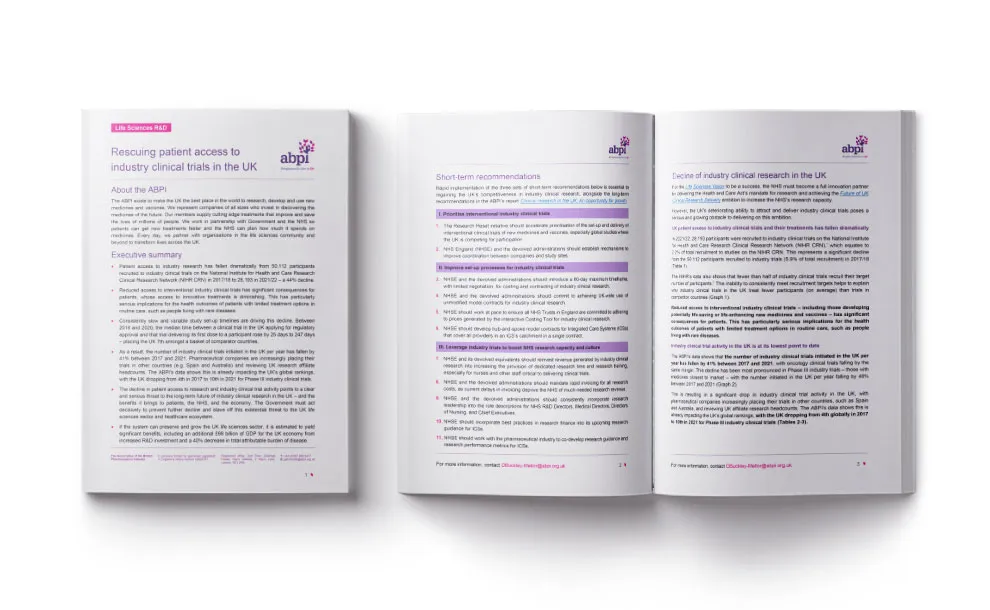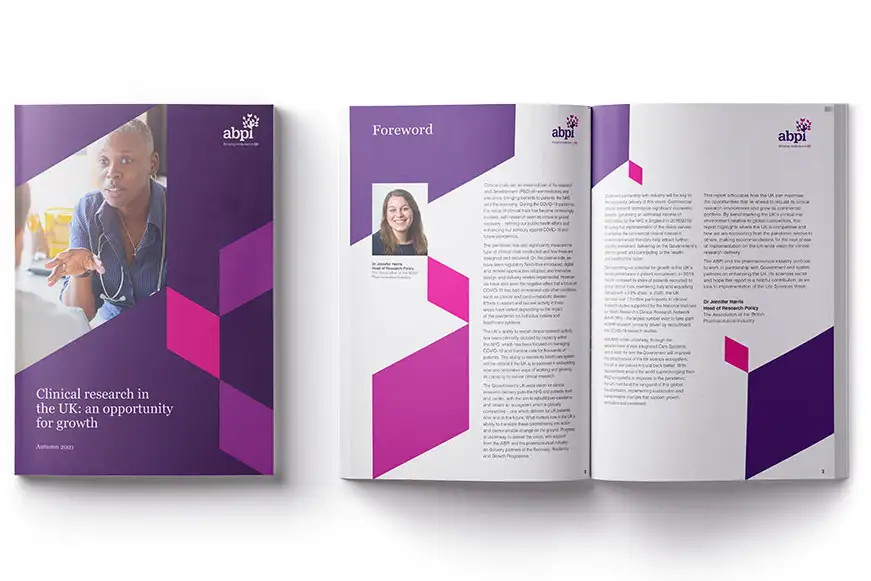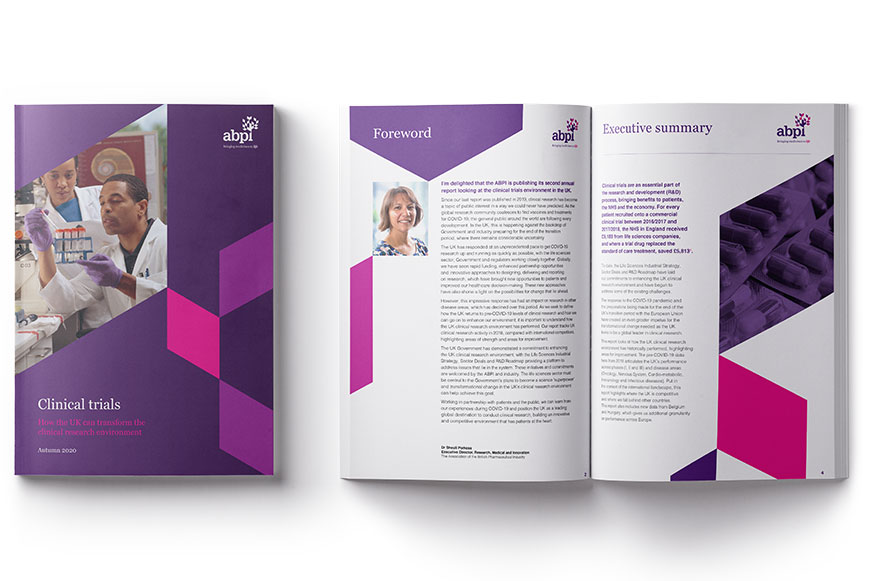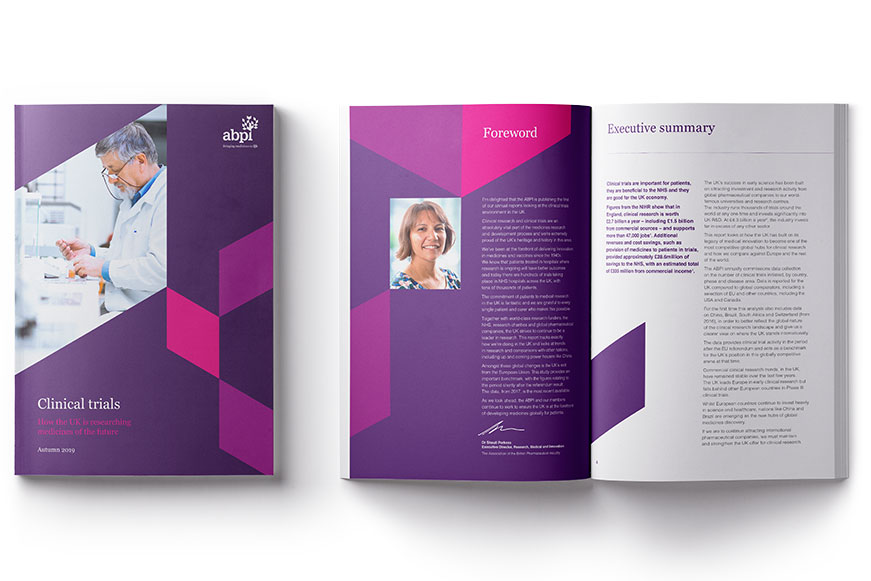Rescuing patient access to industry clinical trials in the UK
For the Life Sciences Vision to be a success, the NHS must become a full innovation partner by delivering the Health and Care Act’s mandate for research and achieving the Future of UK Clinical Research Delivery ambition to increase the NHS’s research capacity.
However, the UK's deteriorating ability to attract and deliver industry clinical trials poses a serious and growing obstacle to delivering on this ambition.
Executive summary
- Patient access to industry research has fallen dramatically from 50,112 participants recruited to industry clinical trials on the National Institute for Health and Care Research Clinical Research Network (NIHR CRN) in 2017/18 to 28,193 in 2021/22 – a 44% decline.
- Reduced access to interventional industry clinical trials has significant consequences for patients, whose access to innovative treatments is diminishing. This has particularly serious implications for the health outcomes of patients with limited treatment options in routine care, such as people living with rare diseases.
- Consistently slow and variable study set-up timelines are driving this decline. Between 2018 and 2020, the median time between a clinical trial in the UK applying for regulatory approval and that trial delivering its first dose to a participant rose by 25 days to 247 days – placing the UK 7th amongst a basket of comparator countries.
- As a result, the number of industry clinical trials initiated in the UK per year has fallen by 41% between 2017 and 2021. Pharmaceutical companies are increasingly placing their trials in other countries (e.g. Spain and Australia) and reviewing UK research affiliate headcounts. The ABPI’s data shows this is already impacting the UK’s global rankings, with the UK dropping from 4th in 2017 to 10th in 2021 for Phase III industry clinical trials.
- The decline in patient access to research and industry clinical trial activity points to a clear and serious threat to the long-term future of industry clinical research in the UK – and the benefits it brings to patients, the NHS, and the economy. The Government must act decisively to prevent further decline and stave off this existential threat to the UK life sciences sector and healthcare ecosystem.
- If the system can preserve and grow the UK life sciences sector, it is estimated to yield significant benefits, including an additional £68 billion of GDP for the UK economy from increased R&D investment and a 40% decrease in total attributable burden of disease.
Rescuing patient access to industry clinical trials in the UK

Short-term recommendations
The decline in patient access to research and industry clinical trial activity points to a clear and serious threat to the long-term future of industry clinical research in the UK – and the benefits it brings to patients, the NHS, and the economy.
The Government must act decisively to prevent further decline and stave off this existential threat to the UK life sciences sector and healthcare ecosystem. Below, the ABPI has set out three sets of actions the Government can support the NHS to take in the next six months to stabilise and increase industry clinical trial activity in the UK.
I. Prioritise interventional industry clinical trials
- The Research Reset initiative should accelerate prioritisation of the set-up and delivery of interventional clinical trials of new medicines and vaccines, especially global studies where the UK is competing for participation.
- NHS England (NHSE) and the devolved administrations should establish mechanisms to improve coordination between companies and study sites.
II. Improve set-up processes for industry clinical trials
- NHSE and the devolved administrations should introduce a 60-day maximum timeframe, with limited negotiation, for costing and contracting of industry clinical research.
- NHSE and the devolved administrations should commit to achieving UK-wide use of unmodified model contracts for industry clinical research.
- NHSE should work at pace to ensure all NHS Trusts in England are committed to adhering to prices generated by the interactive Costing Tool for industry clinical research.
- NHSE should develop hub-and-spoke model contracts for Integrated Care Systems (ICSs) that cover all providers in an ICS’s catchment in a single contract.
III. Leverage industry trials to boost NHS research capacity and culture
- NHSE and its devolved equivalents should reinvest revenue generated by industry clinical research into increasing the provision of dedicated research time and research training, especially for nurses and other staff critical to delivering clinical trials.
- NHSE and the devolved administrations should mandate rapid invoicing for all research costs, as current delays in invoicing deprive the NHS of much-needed research revenue.
- NHSE and the devolved administrations should consistently incorporate research leadership into the role descriptions for NHS R&D Directors, Medical Directors, Directors of Nursing, and Chief Executives.
- NHSE should incorporate best practices in research finance into its upcoming research guidance for ICSs.
- NHSE should work with the pharmaceutical industry to co-develop research guidance and research performance metrics for ICSs.

Use and download the interactive charts and graphs from the report
Facts & figuresLast modified: 02 May 2024
Last reviewed: 02 May 2024


